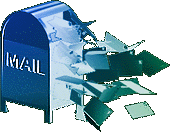| FEEDING - DIETS - TREATS | COOKING BEANS FOR PARROTS |
| FEATHER JUNCTION INDEX | PROMOTIONAL LINKS |
| E-MAIL US!! | . |
| Lafeber Company
BT7 92 RR#2 Odell, IL, 60460 1-800-842-6445 |
Lake's Ultimate Avian Diet
639 Stryker Avenue St. Paul, MN, 55107 1-800-634-2473 |
Roudybush Feeds
P.O. Box 908 Templeton, CA, 93564 1-800-326-1726 |
| Scenic Bird Foods
Marion Zoological Inc. 113 N. First P.O. Box 212 Marion, KS, 66861 (Avialable only through Veterinarians, and certain dealers) |
Harrison's Bird Foods
c/o HBD Inc 1830 F Street Pawnee City, NE, 68420 1-800-346-0269 |
| Crazy Corn
13330 Bessemer Street Van Nuys, CA, 91491 1-800-BIRD-YUM (1-800-247-3986) |
Flights of Fancy
1594 Hilltop Drive El Cajon, CA, 92020-8227 1-800-776-MEAL (1-800-776-6325) |
| Grubco
P.O. Box 15001 Hamilton, OH, 45015 1-800-222-3563 |
Rainbow Mealworms
126 E. Spruce Street P.O. Box 4907 Compton, CA, 90224 1-213-635-1494 for inquiries-information 1-800-777-9677 (orders) |
| TOP OF PAGE | FEATHER JUNCTION INDEX |

| TOP OF PAGE | FEATHER JUNCTION INDEX |

| TOP OF PAGE | FEATHER JUNCTION INDEX |
